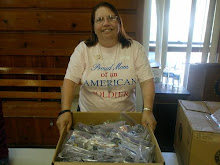The Maine War Front
by G.I. Film Festival
Far away from the war, in Portland, Maine there are people who think about the war every day. They get up every morning, not with the thought of having to pay their mortgages or the thought of far away adventures, but theirs is the thought of continued service to their country – to give back in some small measure. Whether it is 3 am in the morning or 3 pm in the afternoon, 24 hours a day, 365 days a year, these volunteers get up and go out to make a difference in the lives of our departing and returning soldiers.
They see the faces of those deploying to war and the faces of those returning from war every day. They count their numbers and pay their respects in smiles, handshakes and hugs. Who are these dedicated men and women? They are the volunteer troop greeters in Portland, Maine and the subject of an emotionally revealing documentary, The Way We Get By.
The Way We Get By follows three senior citizens, Bill Knight, Joan Gaudet, and Jerry Mundy as they battle with the critical issues common to the nation’s ever-growing aging population. Through their candid and moving stories, viewers are provided with a truthful look at what millions of Americans face each day: loss, heartache, and joy. We learn that you are never too old to serve and that it is never too late to give back to this country.The Way We Get By is directed by Award-winning director and editor Aron Gaudet, who has a personal interest in the story; his mother, Joan Gaudet, is a troop greeter and a character in the film. Aron witnessed how becoming a troop greeter changed her life, which convinced him this was a story that could inspire other people.
Aron has worked on films in the United States, Jordan, and India and worked on projects for the Red Sox, Boston Bruins, and Stephen King. He has earned a total of 8 Telly Awards, 2 Emmy nominations, 2 Vermont Association of Broadcasters awards, and a Michigan Association of Broadcasters award. Aron currently lives and works in Boston and produced this film with his partner, award winning television journalist Gita Pullapilly.
The GI Film Festival is proud to announce this film as an official festival selection the 2009 festival lineup. The GI Film Festival is a 501 c 3 non-profit organization and the only film festival in the nation to honor men and women in uniform. If you like to see more movies like this and believe in our cause, please consider supporting the GI Film Festival with a tax-deductible donation. Every donation helps us continue our mission.
Thank You
3 years ago









